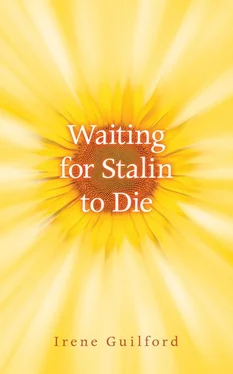Birute languished untended. Batted between brothers, forgotten by fathers, she grew ever more wild. Jurgis would return home from the seminary to find his mother frantic and helpless.
When war came his mother would not leave her husband, her first four sons, her first life or her only love. Surrendering to punishment and guilt, she kissed Birute and him goodbye. Think of me, she said. Children of my heart. And turning back towards a life which would become hell without them, she sent them away.
Gerald Lambert was fourth generation, the only son of a wealthy family which had owned a string of mills on the Humber River. Managing the family assets, he supported his two unmarried and uncomplaining sisters, Violet and Maud. For amusement he ran a tavern. When necessary he sold off a parcel of land from the holdings bequeathed by his forebears. It was just such a parcel that Father Geras hoped to buy, a small section now, the rest as the community raised the money.
Father Geras met Mr. Lambert in his tavern, a large ramshackle building on Scarlett Road. Pushing open a plywood door behind the bar, he entered a room smelling of stale cigarette smoke. The dusty desk was stained with beer rings, the red leather of the swivel chair cracked. Despite his family wealth Mr. Lambert appeared not to be profligate. On such details Father Geras’ hopes rested.
Gerald Lambert rose from behind his desk, extending his hand. A burly man with red blond hair, freckles along his forearms and small tufts of hair on his knuckles, he seemed decent enough. He was also no fool. Father Geras could see the thoughts rolling through the man’s head. A priest was a priest but money was money.
Father Geras asked after Violet and Maud whose names he’d been careful to remember. Assuming an expression of polite interest, he inquired after their health. He was told they were well. Very well. He waited for an invitation to sit down. None came.
“What can I do for you, Father?” Gerald Lambert said, rocking back in his creaking chair.
Father Geras offered a five hundred dollar down payment on an apple orchard lying west of Toronto. Beyond city limits, it would be hard for parishioners to reach. Most relied on the streetcar. Few had cars. But having failed twice to secure land in town, learning afterwards that it had been sold for the same price to someone else, he was settling for the outskirts.
“All very well to offer money for the first piece,” Mr. Lambert said, “but how will you come up with the rest?”
Parishioners dropped nickels and dimes into the collection plate every Sunday. Murmuring at the occasional fluttering of a dollar bill, they would crane their necks to see who had been so generous. Poor people who still gave money would keep on giving, Father Geras wanted to say. They were buying their place of eternal rest. Sensing that Gerald Lambert was not a man responsive to poetics, he put it in more prosaic terms.
“We will raise it. We have five hundred dollars now. The rest will come.”
“I can’t sell piecemeal, Father. I can only sell lock, stock and barrel.”
Father Geras fell silent. He had not expected this. He had expected discussion, a graceful dancing around possibilities but not outright refusal. He shifted the brim of his hat through his fingers.
“Father, I know you need the land for a good purpose,” Gerald Lambert said. “You DPs are decent hard-working people no matter what others say. I’ll give you that. It’s just too risky to sell bit by bit. Forgive me for saying so but what if you dig a few holes, stick some people in the ground then can’t come up with the rest of the money? Where would that leave me? Part owner of a cemetery half-filled with dead people, that’s where.” He gave a rough laugh, amused by his own humour. “No one would want it. I’d never be able to sell the rest. I hope you understand my position, Father. Nothing personal. You’re a man of the cloth but business is business.”
Father Geras sighed. Our families were not rich. We did not come with suitcases full of money. We are starting all over again. We have only our hands and a willingness to work. But he said nothing, sensing that though Gerald Lambert might not be as wealthy as his forebears, he had never been poor.
“You’ve seen the world, Father,” Gerald Lambert continued. “You strike me as a man who knows what’s what.”
Father Geras had seen the world at its worst. He knew its brothels where young girls serviced military men, its prisons where young men were sent to perish. He had looked into stricken, fear-filled faces. He had held the hands of the dying. Praying over them, he had commended their souls to heaven.
“Our people are scattered by wind,” he said. Scattered by the winds of history, he wanted to say but Mr. Lambert did not strike him as a man much interested in history either. “We rest in cemeteries among strangers. We wish to rest among our own people. God will reward you in heaven for your deeds on earth.”
Gerald Lambert rolled his eyes. “No offence, Father, but it’s earthly matters that interest me. Tell you what. I’ll hold the land for six months. You raise the funds. Come back. We’ll talk. I’m as good a Catholic as the next guy. Deal?” he said, rising and extending his hand.
“Deal,” Father Geras said, taking the man’s hand.
Back on the street, he tipped his hat back on his head. Six months. At least the man had not said no. He had been given time. He would find a way.
He found Mrs. Pranaitis in the empty mid-afternoon church, praying in the back pew. Eyes fixed on the large wooden crucifix, knobbed fingers moving along rosary beads, she sought solace. This simple peasant woman in a headscarf was his charge. And he was her shepherd. And settling down beside this aged soul who could not sign her name, he clasped his hands and looked up at the plain wooden body of Christ.
Please God. Help me take care of this poor old woman and others like her. Help me to take care of all of them. Give me guidance to find their place of eternal rest.
No answer came. He did not expect one. God was not a coach who gave private instruction. He gave people strength to find their own way.
Back at the rectory, he was met with Birute’s angry shrieks of frustration about burnt suppers and kitchens filled with smoke. Eating the cabbage rolls which she had made a second time, he only half-listened. His mind was on the tasks ahead. A Canadian who needed convincing to part with land. A flock which needed shepherding. A culture which needed protecting. A homeland which needed freeing. And bending to his food, he was determined to find a way.
Chapter 2

Birute was wilful, wicked, and weak. She wanted what she wanted and didn’t see why she shouldn’t have it. Life was short. It would be gone soon enough. In this new country, with Jurgis so busy, she was lonely, restless and bored.
There had been that stupid farm boy, pestering her behind the barn. Teasing and laughing, batting him away, she’d finally given in. Look at Mother, she’d wanted to say as she bent to her brother’s scolding. For his sake she’d said nothing. Trying to look contrite, she could not help a little grin.
“Birute, you will be the death of me.”
“Oh, don’t get mad. You love me. Don’t you? Don’t you don’t you don’t you?”
“What if, one day, I am not here to rescue you?”
For a moment she fell silent. Then sunshine burbled up in her again. She threw her arms around his neck.
“Oh, but you are.”
Читать дальше













